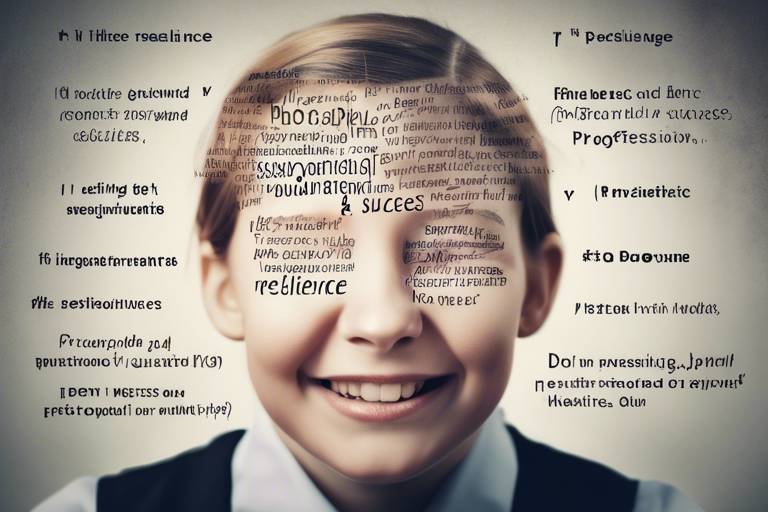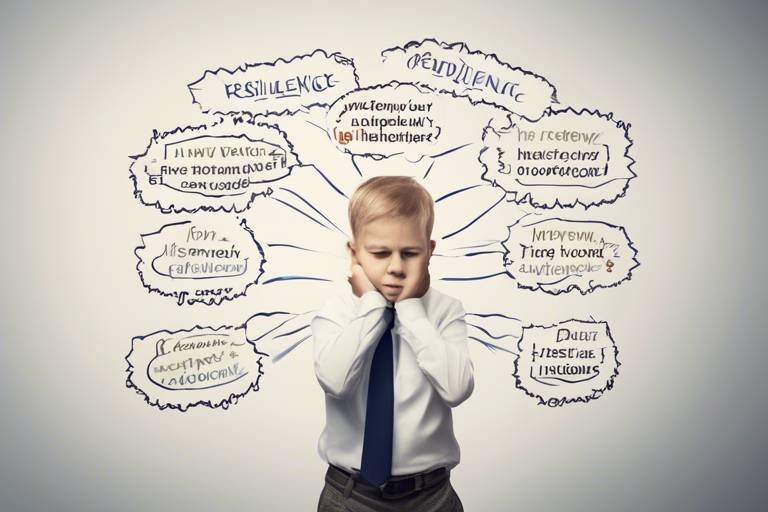Effective Skills for Building Resilience at Work
In today’s fast-paced work environment, the ability to adapt and bounce back from challenges is more important than ever. Resilience isn’t just a buzzword; it’s a crucial skill that can significantly impact your career trajectory and overall job satisfaction. Imagine facing a mountain of deadlines, unexpected changes, or even interpersonal conflicts. How do you navigate these turbulent waters without capsizing? This article dives deep into essential skills that can help you build resilience, equipping you with practical strategies to thrive amid stressors in your professional life.
Resilience is defined as the ability to recover quickly from difficulties. It’s like a rubber band—no matter how much you stretch it, it snaps back to its original shape. In the workplace, resilience is vital not only for personal well-being but also for enhancing overall performance. When you’re resilient, you’re more likely to maintain a positive outlook, tackle challenges head-on, and ultimately achieve greater job satisfaction. Think about it: wouldn’t you rather be the person who rolls with the punches rather than one who crumbles under pressure?
One of the cornerstones of resilience is emotional intelligence (EI). This skill involves recognizing, understanding, and managing your own emotions while also being sensitive to the emotions of others. In a challenging work environment, having a high EI can enhance your interpersonal relationships and improve your coping mechanisms. For example, when faced with criticism, emotionally intelligent individuals can respond thoughtfully rather than reacting defensively, which can lead to more constructive outcomes.
At the heart of emotional intelligence lies self-awareness. This means being conscious of your thoughts, feelings, and behaviors and understanding how they affect others. To cultivate self-awareness, you might consider techniques such as:
- Regularly reflecting on your emotional responses.
- Seeking feedback from trusted colleagues.
- Engaging in self-assessment tools.
By increasing your self-awareness, you’ll be better equipped to manage your emotional triggers and respond to workplace challenges more effectively.
Incorporating mindfulness practices into your daily routine can significantly improve your self-awareness. Mindfulness is about being present in the moment and observing your thoughts and feelings without judgment. Techniques such as meditation, deep breathing, and even mindful walking can help you stay grounded during stressful situations. Imagine being in a meeting where tensions are high; a few deep breaths can help you regain your composure and respond more thoughtfully.
Journaling is another powerful tool for self-reflection. By writing down your thoughts and feelings, you can process your emotions more effectively. This practice not only helps you understand your emotional landscape but also allows you to track your growth over time. Consider setting aside just ten minutes a day to jot down your experiences and insights. You might be surprised at how much clarity this brings!
Effective stress management is crucial for building resilience. It’s like having a toolkit that you can rely on when the going gets tough. Here are some techniques that can help:
- Time Management: Prioritize tasks and break them into manageable chunks.
- Relaxation Exercises: Incorporate activities like yoga or progressive muscle relaxation into your routine.
By mastering these techniques, you’ll be better equipped to handle the pressures of the workplace.
Having a robust support network is vital for resilience. It’s like having a safety net that catches you when you fall. Cultivating relationships with colleagues and mentors can provide you with guidance, encouragement, and different perspectives during tough times. Consider reaching out to someone you admire at work and ask for a coffee chat. You might find that sharing experiences can lighten your load and offer new insights.
Collaboration fosters a sense of community and belonging. When you work together with your team, you create a shared goal that can enhance resilience. Think of it as being part of a sports team; everyone has a role, and when you support each other, you’re more likely to win the game. Teamwork encourages mutual support and can help you navigate challenges more effectively.
Constructive feedback is essential for growth. By actively seeking feedback from peers and supervisors, you can identify areas for improvement and build resilience through learning. Instead of fearing criticism, view it as an opportunity for development. After all, every piece of feedback is a stepping stone toward becoming the best version of yourself.
A growth mindset empowers you to view challenges as opportunities for development. Instead of feeling defeated by setbacks, you’ll learn to embrace them with curiosity and optimism. This shift in perspective can significantly enhance your resilience. Imagine seeing a difficult project not as a burden but as a chance to learn something new!
Embracing challenges is a key aspect of a growth mindset. When faced with obstacles, ask yourself: “What can I learn from this?” This mindset encourages you to approach difficulties with optimism and curiosity, leading to personal and professional growth. Remember, every challenge is a chance to stretch your abilities!
Continuous learning is vital for resilience. In a rapidly changing work environment, pursuing new skills and knowledge will help you adapt and overcome obstacles effectively. Consider enrolling in workshops, online courses, or even reading books related to your field. The more you learn, the more equipped you’ll be to tackle whatever comes your way.
Q: What is resilience?
A: Resilience is the ability to bounce back from adversity, stress, or challenges. It’s an essential skill that helps individuals maintain a positive outlook and achieve job satisfaction.
Q: How can I improve my emotional intelligence?
A: You can improve your emotional intelligence by practicing self-awareness, actively listening to others, and managing your emotions effectively. Techniques like mindfulness and journaling can also help.
Q: Why is a support network important?
A: A support network provides encouragement, guidance, and different perspectives, making it easier to navigate challenges in the workplace.
Q: What is a growth mindset?
A: A growth mindset is the belief that abilities can be developed through dedication and hard work. It encourages individuals to view challenges as opportunities for growth.

Understanding Resilience
Resilience is more than just a buzzword; it’s a vital skill that can make or break your experience in the workplace. Think of resilience as your personal rubber band—it allows you to stretch and bend without breaking under pressure. In an environment where deadlines loom and challenges arise, being resilient means you can bounce back from setbacks, adapt to change, and keep moving forward. But why is this so important? Well, research shows that resilient individuals not only perform better but also report higher levels of job satisfaction. They are better equipped to handle stress, which can lead to improved mental health and workplace relationships.
In a professional setting, resilience contributes to a positive workplace culture. When employees demonstrate resilience, they inspire their colleagues to do the same, creating a ripple effect of motivation and support. This collective resilience can transform the workplace into a thriving community where challenges are viewed as opportunities for growth rather than insurmountable obstacles. Imagine a team that faces a tough project; instead of crumbling under pressure, they pull together, share ideas, and emerge stronger. That’s the power of resilience!
Moreover, resilience is not just about individual strength; it’s also about how we interact with our environment. It involves recognizing that while we may not control every situation, we can control our reactions. When we understand that setbacks are a natural part of any career, we can approach them with a mindset geared towards learning and improvement. This perspective shift is crucial in fostering resilience, allowing individuals to navigate through the stormy seas of workplace challenges with confidence.
To further illustrate the significance of resilience, let’s consider some key benefits:
- Enhanced Problem-Solving Skills: Resilient individuals are often better at thinking critically and finding solutions under pressure.
- Improved Emotional Well-being: By managing stress effectively, resilient employees experience lower levels of anxiety and depression.
- Stronger Relationships: Resilience fosters better communication and collaboration among team members.
- Increased Adaptability: Those who are resilient are more open to change and can pivot quickly when faced with new challenges.
In summary, understanding resilience is crucial for anyone looking to thrive in their career. It’s not just about enduring difficulties; it’s about using them as stepping stones for growth. By building resilience, you equip yourself with the tools needed to navigate the complexities of the workplace, ensuring that you not only survive but thrive in your professional journey.

Emotional Intelligence
is more than just a buzzword; it’s a crucial skill that can significantly impact your resilience in the workplace. Think of it as your emotional toolkit, allowing you to navigate the often turbulent waters of professional life. When you develop emotional intelligence, you not only enhance your ability to manage stress but also improve your relationships with colleagues, leading to a more harmonious work environment. After all, we are social beings, and our ability to connect with others can make or break our experience at work.
So, what exactly does emotional intelligence entail? At its core, it involves recognizing, understanding, and managing our own emotions, as well as empathizing with the emotions of others. This dual focus can help you respond to challenges with a calm and collected demeanor rather than reacting impulsively. By honing your emotional intelligence, you can create a more supportive workplace culture, where everyone feels valued and understood.
One of the most significant benefits of emotional intelligence is its role in enhancing interpersonal relationships. When you can identify and articulate your feelings, you’re more likely to communicate effectively with your colleagues. This leads to better teamwork and collaboration, which are essential in overcoming workplace challenges. For instance, consider a scenario where a team is facing a tight deadline. If one member is feeling overwhelmed, a colleague with high emotional intelligence can recognize this emotion and offer support, whether through encouragement or assistance with tasks. This not only helps the individual but also strengthens the team as a whole.
Furthermore, emotional intelligence enables you to cope with stress more effectively. By understanding your emotional triggers, you can develop strategies to manage your reactions. For example, if you know that tight deadlines make you anxious, you can prepare in advance by breaking projects into smaller, manageable tasks. This approach not only reduces stress but also enhances your productivity.
To illustrate the impact of emotional intelligence on resilience, let’s take a look at the key components that contribute to this skill:
| Component | Description |
|---|---|
| Self-Awareness | The ability to recognize your own emotions and their effects on your thoughts and behavior. |
| Self-Regulation | Managing your emotions in healthy ways, including controlling impulsive feelings and behaviors. |
| Empathy | The ability to understand the emotions of others and respond appropriately. |
| Social Skills | The skills needed to manage relationships and build networks effectively. |
| Motivation | A passion for work that goes beyond money and status, driven by a desire to fulfill one’s own inner potential. |
Incorporating emotional intelligence into your daily routine can lead to remarkable changes in how you handle stress and interact with others. It’s like adding a new lens through which you view your work life, allowing you to see opportunities for connection and collaboration rather than just challenges and obstacles. By investing in your emotional intelligence, you’re not only enhancing your resilience but also paving the way for a more fulfilling and productive career.
As you embark on this journey of enhancing your emotional intelligence, remember that it’s a continuous process. Just like building muscle, it requires practice and dedication. Start small—perhaps by engaging in active listening during conversations or reflecting on your emotional responses at the end of each day. Over time, you’ll find that your ability to navigate the complexities of the workplace improves, leading to a more resilient you.

Self-Awareness
Self-awareness is like holding up a mirror to your soul, allowing you to see not just your reflection but the intricate emotions and thoughts that shape your behavior. It's the cornerstone of emotional intelligence and a critical skill for building resilience in the workplace. When you become self-aware, you gain insight into your strengths, weaknesses, and triggers, which empowers you to navigate challenges with greater ease. Imagine being in a high-pressure meeting where your heart races, and your palms sweat. If you recognize these physical signs as stress indicators, you can take a moment to breathe and center yourself instead of reacting impulsively.
To enhance your self-awareness, consider implementing the following techniques:
- Regular Self-Reflection: Take time each day to reflect on your experiences. Ask yourself what went well, what didn't, and how you felt during those moments. This practice can illuminate patterns in your behavior and emotional responses.
- Seek Feedback: Sometimes, we are blind to our own habits and traits. Engaging with trusted colleagues or friends to gather constructive feedback can provide valuable insights into how others perceive you.
- Mindfulness Meditation: Practicing mindfulness helps you to stay present and aware of your thoughts and feelings without judgment. This can lead to a deeper understanding of your emotional landscape.
Another effective method to boost self-awareness is through journaling. Writing down your thoughts and feelings can be a cathartic experience. It allows you to process emotions and identify triggers in a safe space. For example, after a challenging day, jotting down your experiences can help you articulate feelings that may otherwise remain bottled up. Over time, this practice will not only enhance your self-awareness but also serve as a record of your growth.
In addition, consider using tools like personality assessments or emotional intelligence quizzes. These resources can provide structured insights into your behavior and emotional responses, helping you identify areas for improvement. The key is to approach this journey with an open mind and a willingness to learn about yourself.
Ultimately, self-awareness is not just about recognizing your emotions; it’s about understanding how they influence your interactions and decisions at work. By cultivating this awareness, you can respond to stressors more effectively, build stronger relationships with colleagues, and foster a more resilient mindset. Remember, every step you take towards understanding yourself better is a step towards thriving in your professional life.

Mindfulness Practices
In today's fast-paced work environment, stress can often feel like an unwelcome companion. To combat this, incorporating into your daily routine can be a game changer. Mindfulness isn't just about sitting quietly and meditating; it's a way of being present, focusing on the moment, and acknowledging your thoughts and feelings without judgment. By doing so, you can significantly enhance your self-awareness and emotional regulation, which are crucial for building resilience.
One effective mindfulness practice is deep breathing. This simple technique can help you center yourself when stress levels rise. Take a moment to close your eyes, inhale deeply through your nose, hold for a few seconds, and then exhale slowly through your mouth. This not only calms your mind but also reduces physical tension, allowing you to approach challenges with a clearer perspective.
Another popular technique is guided meditation. You can find numerous apps and online resources that provide structured sessions tailored to various needs, whether you want to focus on stress relief, improving concentration, or enhancing creativity. These sessions often last anywhere from 5 to 30 minutes, making it easy to fit into your busy schedule.
Additionally, practicing mindful walking can be incredibly beneficial. Instead of rushing from one meeting to another, take a moment to engage fully with your surroundings. Notice the sensation of your feet touching the ground, the sounds around you, and the rhythm of your breath. This practice not only grounds you but also transforms mundane moments into opportunities for mindfulness.
Journaling can also serve as a mindfulness practice. By writing down your thoughts and feelings, you create a space for self-reflection. This process allows you to process emotions and gain insights into your responses to various situations. Consider dedicating a few minutes each day to jot down your experiences, focusing on what you learned or how you felt during the day. This can be particularly helpful in recognizing patterns in your emotional responses and triggers.
Incorporating these mindfulness practices into your work life can foster a greater sense of calm and clarity. By becoming more aware of your thoughts and feelings, you can better manage stress and enhance your resilience. Remember, it's not about eliminating stress entirely; it's about learning to navigate it with grace and ease.

Journaling for Reflection
Journaling is not just a trendy pastime; it's a powerful tool for self-reflection and personal growth. Imagine having a space where you can pour out your thoughts, feelings, and experiences without any judgment. That’s what journaling offers—a sanctuary for your mind. When we write down our emotions, we create a tangible connection to our inner selves, allowing us to process our experiences more deeply. Have you ever noticed how just putting pen to paper can clear the fog in your mind? It’s like shining a light on your thoughts, making them easier to navigate.
One of the greatest benefits of journaling is its ability to enhance self-awareness. By regularly reflecting on your day-to-day experiences, you can identify patterns in your thoughts and behaviors. This can be particularly helpful in the workplace, where stressors can cloud judgment and decision-making. For instance, if you notice that you often feel overwhelmed after certain meetings, journaling can help you pinpoint what specifically triggers those feelings. Once you understand your emotional responses, you can take proactive steps to address them.
Moreover, journaling encourages a habit of gratitude. When you take the time to write about the positive aspects of your day, no matter how small, you shift your focus from stressors to blessings. This shift in perspective can be transformative. You might start to notice that even on tough days, there are moments of joy and achievement worth celebrating. Here are some prompts you might consider for your journaling practice:
- What was the best part of my day?
- What challenges did I face, and how did I overcome them?
- What am I grateful for today?
- How did I help someone else today?
Incorporating journaling into your routine doesn’t have to be a daunting task. You can start small—perhaps by setting aside just five minutes each day. The key is consistency. Over time, you’ll find that journaling becomes a natural part of your day, much like your morning coffee. You might even discover that it serves as a form of therapy, helping you untangle complex emotions and thoughts.
Additionally, journaling can serve as a historical record of your personal and professional growth. Looking back at past entries can provide valuable insights into how far you've come and the challenges you've overcome. This retrospective view can be incredibly motivating, especially during times when you feel stuck or overwhelmed. It’s a reminder that you are capable of resilience and growth.
In conclusion, journaling for reflection is a simple yet effective strategy for enhancing resilience at work. It fosters self-awareness, promotes gratitude, and serves as a powerful tool for processing emotions. So why not give it a try? Grab a notebook, find a quiet spot, and start your journey towards greater self-discovery and emotional resilience today!
Q: How often should I journal?
A: While there’s no strict rule, journaling a few times a week can be beneficial. The key is to find a rhythm that works for you.
Q: What should I write about?
A: You can write about anything that comes to mind—your daily experiences, emotions, goals, or even gratitude lists. The important thing is to be honest and open.
Q: Do I need a special journal?
A: Not at all! Any notebook or even a digital app will do. What matters is that it feels comfortable for you to express yourself.

Stress Management Techniques
Stress is an inevitable part of our work lives, but how we manage it can make all the difference. Effective empower us to navigate challenges with grace and resilience. Imagine stress as a wave; if we learn to ride it rather than fight it, we can maintain our balance and even enjoy the ride. So, how can we develop these essential skills to manage stress effectively?
One of the first steps in managing stress is mastering time management. When tasks pile up and deadlines loom, it’s easy to feel overwhelmed. By organizing your tasks and prioritizing them, you can create a clear action plan. Consider using tools like calendars or project management apps to keep track of your responsibilities. Break larger projects into smaller, manageable tasks, and celebrate small victories along the way. This not only reduces stress but also boosts your confidence as you check things off your list.
Another crucial technique is incorporating relaxation exercises into your daily routine. Simple practices such as deep breathing, meditation, or progressive muscle relaxation can significantly lower stress levels. For instance, try the following deep breathing exercise: inhale deeply for a count of four, hold for four, and exhale for four. Repeat this several times, and you’ll be surprised at how quickly you can calm your mind and body. Regularly setting aside just a few minutes for relaxation can create a ripple effect, enhancing your overall well-being.
Additionally, maintaining a healthy lifestyle plays a pivotal role in stress management. Engaging in regular physical activity, eating a balanced diet, and ensuring adequate sleep can help your body handle stress more effectively. For example, exercise releases endorphins, which are natural mood lifters. Even a brisk walk during your lunch break can refresh your mind and reduce feelings of anxiety. It’s essential to establish a routine that includes these healthy habits, as they can serve as your first line of defense against stress.
Lastly, don’t underestimate the power of social support. Building and nurturing relationships with colleagues can provide a buffer against stress. When you feel overwhelmed, reaching out to a trusted coworker can offer you a fresh perspective and emotional support. Consider forming a small support group where you can share experiences and strategies for managing stress. This camaraderie not only fosters resilience but also creates a sense of belonging in the workplace.
In conclusion, mastering stress management techniques is not just about coping; it's about thriving in your work environment. By implementing effective time management, relaxation exercises, a healthy lifestyle, and building social support networks, you can transform stress from a daunting obstacle into a manageable part of your professional journey.
- What are some quick stress relief techniques I can use at work?
Quick techniques include deep breathing exercises, taking short breaks, and practicing mindfulness for a few minutes.
- How can I improve my time management skills?
Try using planners or digital tools to prioritize tasks, set deadlines, and allocate specific times for each task.
- Is exercise really effective for stress management?
Yes! Regular physical activity helps reduce stress hormones and releases endorphins, which improve mood.
- How can I build a support network at work?
Start by engaging with colleagues, participating in team activities, and being open to sharing your experiences and challenges.

Building a Support Network
In today's fast-paced work environment, the importance of building a support network cannot be overstated. Think of your support network as a safety net; it catches you when you stumble and helps you regain your footing. Having a strong network of colleagues, mentors, and friends can provide the encouragement needed to navigate through tough times, making the difference between feeling overwhelmed and empowered. In essence, a solid support system not only boosts your resilience but also enhances your overall job satisfaction.
So, how do you go about cultivating this invaluable network? Start by identifying the key players in your workplace. These could be colleagues who share similar goals, mentors who have walked the path before you, or even friends who understand the challenges of your profession. Once you have a clear idea of who should be in your corner, it's time to take action. Reach out to them! Schedule coffee chats, engage in team-building activities, or simply ask for their insights on a project you're working on. Remember, networking is not just about what you can gain; it’s also about what you can offer in return.
One effective way to foster these relationships is through team collaboration. When you work closely with others, you create a sense of community that can be incredibly beneficial in times of stress. Engaging in collaborative projects allows you to share not only the workload but also your experiences, struggles, and successes. This shared journey can deepen your connections, making it easier to lean on each other during challenging times.
Moreover, don’t underestimate the power of seeking feedback. Constructive feedback is essential for personal and professional growth. When you ask for input from your peers and supervisors, you not only demonstrate your willingness to improve but also open the door for deeper conversations and relationships. Feedback sessions can serve as a platform for sharing experiences and learning from one another, ultimately strengthening your support network.
In summary, building a robust support network is a proactive step toward enhancing your resilience at work. By fostering relationships through collaboration and seeking feedback, you create a community that can uplift you during challenging times. Remember, you don’t have to navigate your professional journey alone; your support network is there to help you thrive.
- Why is a support network important for resilience?
A support network provides emotional and practical assistance, helping individuals cope with stress and challenges more effectively. - How can I start building my support network?
Begin by identifying key colleagues and mentors, then engage with them through conversations and collaborative projects. - What role does collaboration play in resilience?
Collaboration fosters a sense of community and shared goals, which can enhance mutual support among colleagues during tough times. - How can feedback strengthen my support network?
Seeking feedback opens the door for deeper conversations, allowing for shared learning experiences that can strengthen relationships.

Team Collaboration
Team collaboration is more than just working together; it's about creating a synergistic environment where individuals can thrive and contribute their unique strengths. When team members collaborate effectively, they not only share responsibilities but also build a sense of community that fosters resilience. Imagine a well-oiled machine where each part works in harmony; that’s what collaboration can achieve in the workplace. It’s about leveraging diverse skills and perspectives to tackle challenges head-on, turning potential roadblocks into stepping stones for success.
One of the most significant benefits of team collaboration is the enhanced problem-solving capability. When faced with a tough situation, a group of minds can generate a wider range of solutions than any individual could on their own. This collective brainstorming leads to innovative approaches that might not have been considered otherwise. Moreover, working together encourages a culture of open communication, where team members feel comfortable sharing their ideas and concerns. This transparency not only improves team dynamics but also strengthens the bonds between colleagues, making it easier to navigate through stressful times.
Furthermore, collaboration instills a sense of accountability. When everyone is working towards a common goal, each member feels responsible for contributing their fair share. This shared responsibility can significantly reduce workplace stress because it creates a safety net—knowing that you have support from your teammates can make all the difference during challenging projects. In essence, collaboration transforms the workplace from a competitive arena into a supportive community.
To truly harness the power of team collaboration, consider implementing the following strategies:
- Encourage open dialogue: Create an environment where team members feel safe to express their thoughts and ideas without fear of judgment.
- Set clear goals: Ensure that everyone understands the objectives and their roles within the team to foster alignment and purpose.
- Utilize collaborative tools: Invest in technology that facilitates communication and project management, such as Slack, Trello, or Microsoft Teams.
- Celebrate achievements: Acknowledge both individual and team successes to boost morale and reinforce the value of collaboration.
In conclusion, team collaboration is a vital skill for building resilience in the workplace. By fostering a culture of cooperation and support, organizations can not only enhance their problem-solving capabilities but also create a more positive and productive work environment. Remember, when teams come together, they are not just sharing tasks; they are building a resilient foundation that can withstand the pressures of the modern workplace.
Q: What is team collaboration?
A: Team collaboration refers to the process where individuals work together towards a common goal, sharing ideas, responsibilities, and support to enhance productivity and problem-solving.
Q: Why is team collaboration important for resilience?
A: It creates a supportive environment, encourages open communication, and fosters a sense of accountability, all of which are essential for overcoming challenges and reducing stress.
Q: How can I improve collaboration in my team?
A: You can improve collaboration by encouraging open dialogue, setting clear goals, utilizing collaborative tools, and celebrating achievements together.

Seeking Feedback
Seeking feedback is not just a formality; it's a powerful tool for personal and professional growth. In a world where change is the only constant, the ability to adapt and improve is crucial. Feedback acts like a mirror, reflecting our strengths and areas for improvement. But why is it so important? Well, think of it this way: just like a gardener needs to know how much water and sunlight their plants need, we need insights from others to nurture our skills and career. Without feedback, we might be watering our metaphorical plants too much or too little!
When you actively seek feedback from your peers and supervisors, you’re opening the door to a wealth of knowledge and perspectives that you might not have considered. This process not only helps you identify your weaknesses but also reinforces your strengths. It’s like having a personal coach who guides you through the challenging aspects of your job. Moreover, it fosters a culture of open communication, where colleagues feel comfortable sharing their thoughts and experiences.
Here are a few strategies to effectively seek and utilize feedback:
- Be Specific: When asking for feedback, be clear about what you want to know. Instead of a vague “What do you think?”, try “Can you provide insights on my presentation skills?” This specificity can lead to more constructive feedback.
- Choose the Right Time: Timing is everything. Approach your colleagues or supervisors when they are not rushed or stressed. A calm environment can lead to more thoughtful responses.
- Show Appreciation: Always thank those who take the time to give you feedback. This not only shows gratitude but also encourages them to continue providing insights in the future.
Feedback can also be a double-edged sword. It’s essential to approach it with an open mind and a positive attitude. Remember, not all feedback will be easy to hear. Sometimes it can sting a little, but that’s where the real growth happens. Embrace constructive criticism as a stepping stone towards becoming a better version of yourself. By actively seeking feedback, you’re not just passively waiting for opportunities to grow; you’re taking charge of your development journey.
In conclusion, seeking feedback is an integral part of building resilience in the workplace. It empowers you to learn from your experiences, adapt to challenges, and ultimately thrive in your professional life. So, don’t shy away from asking for insights; instead, embrace it as a valuable resource on your path to success.
- Why is feedback important in the workplace? Feedback provides insights into your performance, helping you identify strengths and areas for improvement, which is crucial for personal and professional growth.
- How can I effectively ask for feedback? Be specific about what you want feedback on, choose an appropriate time, and show appreciation for the insights you receive.
- What if I receive negative feedback? View it as an opportunity for growth. Reflect on the feedback, identify actionable steps, and remember that everyone has areas to improve.

Adopting a Growth Mindset
In today’s fast-paced work environment, adopting a growth mindset is more than just a buzzword; it’s a transformative approach that can redefine how you tackle challenges. Imagine viewing every obstacle as a stepping stone rather than a stumbling block. This shift in perspective can significantly enhance your resilience and overall job satisfaction. A growth mindset encourages you to see failures not as endpoints but as valuable lessons that propel you toward success. It’s about embracing the idea that your abilities and intelligence can be developed through dedication and hard work.
But how do you cultivate this mindset? First, it’s essential to embrace challenges. Instead of shying away from tasks that seem daunting, approach them with curiosity and an open mind. Consider challenges as opportunities to learn and grow. For instance, if you’re assigned a project that stretches your skills, rather than feeling overwhelmed, think about the new techniques you might learn and how they could benefit your career in the long run. This proactive approach fosters a sense of accomplishment and boosts your confidence.
Next, continuous learning plays a crucial role in fostering a growth mindset. In a world where change is the only constant, keeping your skills sharp is vital. Consider setting aside time each week for professional development. This could involve online courses, workshops, or even reading industry-related books. The more you learn, the more adaptable you become, making it easier to navigate the complexities of your job. Here’s a simple table to illustrate how continuous learning can enhance your resilience:
| Learning Activity | Benefits |
|---|---|
| Online Courses | Enhance skills, gain certifications, increase employability |
| Networking Events | Build connections, share knowledge, discover new opportunities |
| Reading Industry Books | Stay updated, gain insights, inspire creativity |
Moreover, maintaining a positive attitude toward feedback can significantly bolster your growth mindset. Instead of viewing constructive criticism as a personal attack, see it as an opportunity for improvement. When you receive feedback, reflect on it, identify areas for growth, and take actionable steps to enhance your performance. This not only helps you develop but also demonstrates to others that you are committed to your personal and professional growth.
Lastly, remember that cultivating a growth mindset is an ongoing journey. It requires patience and practice. Surround yourself with individuals who also embrace this mindset; their positivity can be contagious and motivate you to keep pushing your boundaries. Whether through mentorship or peer support, having a network of like-minded individuals can provide encouragement and accountability as you navigate your professional path.
- What is a growth mindset? A growth mindset is the belief that your abilities and intelligence can be developed through dedication and hard work.
- How can I develop a growth mindset? Embrace challenges, seek feedback, and commit to continuous learning.
- Why is a growth mindset important in the workplace? It fosters resilience, encourages innovation, and enhances overall job satisfaction.

Embracing Challenges
Embracing challenges is not just a catchphrase; it's a powerful mindset that can transform the way we approach obstacles in our professional lives. When faced with a daunting task, many people instinctively feel overwhelmed, but what if we could flip that script? Instead of viewing challenges as barriers, we can see them as stepping stones to growth. This shift in perspective can be incredibly liberating, allowing us to tackle difficulties with a sense of curiosity and optimism.
Imagine standing at the base of a mountain, looking up at the peak. The ascent seems intimidating, and the thought of climbing can be filled with doubt. However, if you focus on the journey rather than the summit, each step becomes an opportunity to learn and develop. Embracing challenges means recognizing that each obstacle is a chance to sharpen our skills, enhance our resilience, and ultimately become better versions of ourselves.
To truly embrace challenges, consider the following strategies:
- Reframe Your Thoughts: Instead of saying, "I can't do this," try telling yourself, "This is a chance for me to learn something new." This simple shift can dramatically change your approach to challenges.
- Set Small Goals: Breaking down a large challenge into smaller, manageable tasks can help reduce feelings of overwhelm. Celebrate each small victory along the way!
- Seek Support: Remember, you don’t have to face challenges alone. Lean on your colleagues or mentors for guidance and encouragement.
Moreover, embracing challenges fosters a culture of resilience within teams. When individuals share their experiences of overcoming difficulties, it creates a ripple effect, inspiring others to tackle their own challenges head-on. This collaborative spirit not only strengthens relationships but also builds a robust support network that can be invaluable during tough times.
In the grand scheme of things, embracing challenges is about cultivating a sense of adventure in our work. It’s about shifting from a fear-based mindset to one that thrives on growth and opportunity. When we approach our professional lives with this attitude, we unlock doors to innovation, creativity, and personal development that we never knew existed. So, the next time you encounter a challenge, ask yourself: "What can I learn from this?" Embrace it, and watch as you not only overcome the obstacle but also emerge stronger and more capable than before.
Q: How can I start embracing challenges in my work?
A: Begin by reframing your thoughts about challenges and viewing them as opportunities for growth. Set small, achievable goals to help manage larger tasks, and seek support from colleagues.
Q: What if I feel overwhelmed by a challenge?
A: It's normal to feel overwhelmed. Take a step back, breathe, and break the challenge into smaller parts. Focus on one step at a time, and don't hesitate to reach out for help.
Q: Can embracing challenges improve my career prospects?
A: Absolutely! Embracing challenges demonstrates resilience and adaptability—qualities that employers highly value. It can lead to personal growth and open up new opportunities in your career.

Continuous Learning
In today's fast-paced work environment, is not just a buzzword; it’s a necessity. The landscape of industries is constantly evolving, and to keep up, employees must be willing to adapt and grow. Think of it as a never-ending journey where every experience, whether good or bad, serves as a stepping stone towards greater knowledge and skill. When you embrace continuous learning, you’re not just enhancing your current abilities; you’re also preparing yourself for future challenges and opportunities.
One of the most exciting aspects of continuous learning is that it can take many forms. It might involve formal education, such as pursuing additional certifications or degrees, or it could be as simple as engaging in online courses or workshops. Additionally, learning can happen informally through daily interactions and experiences at work. For instance, collaborating with a colleague on a project might expose you to new techniques or insights that you hadn’t considered before. This organic form of learning can be incredibly valuable, as it allows you to apply new knowledge in real-time.
Moreover, continuous learning fosters a culture of curiosity and innovation within the workplace. When employees are encouraged to seek out new information and skills, they become more engaged and motivated. This not only leads to personal growth but also enhances overall team performance. Companies that prioritize continuous learning often see improved job satisfaction and lower turnover rates, as employees feel valued and invested in their professional development.
Here are some effective strategies to cultivate a mindset of continuous learning:
- Set Learning Goals: Just like you would set performance targets, establish specific learning objectives. This could be learning a new software tool by the end of the month or reading a certain number of industry-related books each quarter.
- Seek Feedback: Regularly ask for constructive feedback from peers and supervisors. Understanding how others perceive your work can provide valuable insights into areas for improvement.
- Participate in Training Programs: Take advantage of any training sessions offered by your employer. These programs are designed to equip you with new skills and knowledge that can enhance your job performance.
- Network with Others: Engage with professionals in your industry through networking events or online forums. Sharing experiences and insights with others can expose you to different perspectives and ideas.
In conclusion, embracing continuous learning is a powerful way to enhance your resilience at work. By committing to lifelong learning, you not only equip yourself with the tools needed to navigate challenges but also position yourself as a valuable asset to your organization. Remember, the more you learn, the more you grow, and the better prepared you are to tackle whatever comes your way.
Q: What is continuous learning?
A: Continuous learning refers to the ongoing, voluntary, and self-motivated pursuit of knowledge for personal or professional development. It encompasses various methods, including formal education, online courses, workshops, and informal learning through experiences and interactions.
Q: Why is continuous learning important in the workplace?
A: Continuous learning is crucial because it helps employees adapt to changes, enhances their skills, and improves job satisfaction. Organizations that prioritize continuous learning often see increased innovation and lower employee turnover.
Q: How can I start my journey of continuous learning?
A: You can start by setting specific learning goals, seeking feedback, participating in training programs, and networking with others in your field. Online platforms also offer a wealth of resources for self-paced learning.
Frequently Asked Questions
- What is resilience in the workplace?
Resilience in the workplace is the ability to bounce back from challenges and setbacks. It involves adapting positively to stressors, maintaining productivity, and ensuring job satisfaction even in tough times. Think of it as your mental elasticity; the more flexible you are, the better you can handle whatever life throws your way!
- How does emotional intelligence contribute to resilience?
Emotional intelligence is crucial for resilience because it helps individuals recognize and manage their emotions effectively. By understanding their feelings and those of others, employees can navigate difficult situations better, build stronger relationships, and cope with stressors more efficiently. It’s like having a superpower that allows you to read the room and respond appropriately!
- What are some effective stress management techniques?
There are several effective stress management techniques you can adopt, including:
- Time management strategies to prioritize tasks
- Relaxation exercises like deep breathing or meditation
- Physical activities such as walking or yoga to release tension
Using these techniques can help you keep stress at bay and maintain your resilience during challenging times.
- Why is building a support network important?
A strong support network is vital for resilience as it provides emotional and practical support when you face challenges. Having colleagues and mentors to lean on can make a huge difference in how you cope with stress and adversity. It's like having your own cheerleading squad, ready to lift you up when you need it most!
- What is a growth mindset, and how does it enhance resilience?
A growth mindset is the belief that abilities and intelligence can be developed through dedication and hard work. This mindset encourages individuals to view challenges as opportunities for learning and growth, which enhances resilience. Instead of fearing failure, you see it as a stepping stone to success—like climbing a mountain where each slip teaches you how to climb better!



















